When Audrey Scott and Daniel Noll left their stable lives and jobs to travel around the world in December 2006, they expected to be on the road for 12 months. Over two and a half years later they are barely halfway there; exploration takes time. You may find them on a chicken bus snacking on street food one day, photographing microfinance programs the next and climbing volcanoes after that. Please enjoy a week-in-the-life of Audrey and Daniel of Uncornered Market while traveling through Guatemala. (This post was originally published in 2009; links and some info updated since then)
We share sample week from Guatemala. But it could well have been Armenia, Uzbekistan or Nepal. We roll from one bus ride to town to guesthouse to street stall to project. It’s a balance of travel, work and trying to create a fulfilling life on the road.
This post was originally published in 2009. It has since been updated for accuracy of links and content.
Tuesday
8 AM: Arrived at the Xela (Quetzaltenango) bus station right as our bus was leaving. Throw bags on the top of chicken bus and hurry inside. Fortunately, there are still seats remaining. Endless number of stops for a 90-minute trip to Totonicapan. A vendor gets on the front, another off the back. So many people selling stuff, from freshly made potato chips to school supplies guaranteed to bring your kids straight A’s.
10 AM: Arrive at hotel and realize that we misunderstood on the phone the price of a room with private bathroom. Decide to take room with shared bathroom for half the price. Hotel seems to be for Guatemalan traders; other guests aren’t expecting two Gringos. Room is about two feet wider than the beds; looks like we’ll need to break out the sleep sacks to avoid bed bugs.
11 AM: Get some breakfast – rice and beans – with construction workers at makeshift food stalls near the construction site of the main square. Venture into town to explore the weekly market; fruit, vegetables, embroidered shirts, weaving, meat, books. Vendors keep giving us warnings about pickpockets; we hold our camera even closer.
1 PM: Find a restaurant with real coffee and rest our legs. Sign promises wifi internet, but we soon find out it’s an empty promise.
5 PM: Take a minibus to a village outside of town to meet a Kiva fellow for dinner at her host brother’s restaurant. He had lived in the States for ten years and was starting afresh back home with a simple restaurant.
9:30 PM: Try to catch the bus back to town, but we’ve missed the last one. Become friends with a store owner while waiting; he decides to take us to town himself in his car. Word spreads and soon the car is packed with all his relatives.
Wednesday
5 AM: Sounds like a party outside. Television blaring, loud conversation. Regretting decision not to wear earplugs.
6:30 AM: Party ends 15 minutes before alarm goes off. Not the best way to start a long day.
8 AM: Back on the minibus to the village to work with microfinance organization and Kiva fellow. Next five hours spent visiting Kiva borrowers in different villages, photographing them and hearing their stories of how they’ve used their small loans to start businesses and improve life for their families. Stretch our limited Spanish skills to ask questions about family businesses so that they relax. Forget the camera and we can get some good shots.
4 PM: Try to connect at another restaurant promising wifi. No such luck. Walk the streets looking for an internet café to check email.
8 PM: Transfer and geotag all photos from the day’s photo shoot. Watch a movie and collapse.
Thursday
9 AM: Choose photos from previous day’s photo shoot over breakfast.
12 PM: Find internet café to upload video, edit piece for our website and catch up on email correspondence. Hold a vigil so that the connection holds long enough to complete everything. Press “publish,” pack up, and run out the door to catch a bus.
4 PM: Another minivan to the bus station. Designed to hold 17 people, but packed with 30. Each time we think no one else can fit, driver stops to pick up one more person.
Board a chicken bus headed in the direction of “4 Roads” – a spot where two main roads meet. Pretend we don’t speak Spanish to avoid conversation with drunk guy sitting behind us.
All the locals tell us we should get to San Francisco El Alto in 15 minutes. Don’t know if that’s by the Mayan calendar or what. It takes more than 30 minutes just to get to the highway crossing.
5 PM: Bus drops us off on the side of the highway at “4 Roads.” Board another chicken bus, three people on each side. The aisle is packed. The bus sways. As it gets dark outside, the bus driver turns off the inside light. We figure this may not be a bad thing; if we fall off a cliff – a distinct possibility with the way the driver is going – we won’t see it coming.
Ticket guy knows we want to go to San Francisco El Alto, but he gives no signal it’s time to get off. We ask the school kids in the seats around us for help. One girl shrieks at our inquiry and leaves. Another boy yells, “Get off now!”
6 PM: Bus drops us off on the edge of town with two women carrying large bundles tied in brightly colored woven fabric on their heads. It’s dark, we’re without a map and we stand out in the darkness as the only foreigners in town. In this dusty town, lights of local tiendas (shops) shine through the dust giving the place an ethereal quality.
We have a name and address of a hotel. The women find us amusing as we try in our basic Spanish to ask for help, but point us in the right direction.
We wind our way through town as people mill about setting up stands for the following day’s market. With all the news of safety issues at night, we walk fast and with purpose. After a few more stops to ask directions – and avoiding the town drunks who want to practice their English – we end up in the right place: Hotel Galaxia.
6:30 PM: The woman running the hotel gives us the rundown of the market schedule. Stalls go up at 3 AM, but people start buying at 5 AM. Animals get sold behind the Catholic Church.
Our room: there’s only cold water. The up side: a convenient excuse not to take a shower before tomorrow’s 5AM start. But, despite the level of dilapidation – the kind that you cannot imagine the place as new and there are holes in the wall that used to be electrical outlets – we’re happy because it has two plugs (that work) and a wastebasket. Ah, luxury.
6:45 PM: Venture out on the streets to find something to eat. Pickings are pretty slim. A burrito to go and a warm beer.
10 PM: Our sleep sacks have become our best friends; we’re worried about fleas/bed bugs. The last few hotel beds have left us with itchy, red welts along the soft skin of our legs and backs/stomachs.
Friday
5:30 AM: To market we go. The light falls on stack of cowboy hats under the shadow of the church. Cauldrons hint of breakfast. Soup, tamales, tea, tortillas. Girls walk around with large kettles of hot chocolate. Good stuff.
Venture up to the animal market behind the church. Pigs squeal and protest as if they know their imminent fate, geese peck at puppies, cows stubbornly refuse to move, sheep stand patiently as potential buyers turn them upside down and feel around to make sure they’re healthy.
8:30 AM: Market has become crowded. Uncomfortable to walk through the streets; the peacefulness of the early hours is gone. Get some breakfast – tamales and tea – at a local stall and catch a bus back to Xela.
10 AM: Arrival in Xela. Pick up our big bags and check into a guest house. The hot water promised by management is not exactly hot…
12 PM: Lunch at our favorite café as we try to upload photos to FTP for Kiva in the United States. All our praying doesn’t work; the connection is too weak.
4 PM: Stumble upon parade in Xela’s main square. A local tradition for the Friday before holy week is for university students to get dressed up and make floats that poke fun at local and international politicians and events.
6 PM: Meeting with trekking group to get equipment ready for the next morning’s 3-day trek from Xela to Lake Atitlan. Didn’t realize we had to carry sleeping bags and food. Backpacks heavier than expected.
Saturday – Monday
The next three days are spent going straight up hill or straight downhill; there’s only two hours of flat ground in this hike. It’s physically challenging – we’re completely exhausted at the end of each day – but the experience and views (especially watching the sun rise over Lake Atitlan) are worth the effort. Quetzal Trekkers is also a fantastic organization that gives all its profits to a school for street kids and has great volunteer guides.
We hobble into San Pedro on Lake Atitlan, find real coffee, take showers, bandage up our toes and relax with a beer looking over the lake.
Audrey & Daniel are still adventuring through South America, and are currently traveling through Argentina. Next up: Buenos Aires and heading south to Patagonia. They work with microfinance programs as they travel, and have seen first-hand positive effects of the work of both Kiva and Five Talents, and they recommend you check these organizations out. You can read about their own experiences with these organizations in India, Guatemala, and Nicaragua. And of course, you can learn about their current adventures on their award-winning blog at Uncornered Market.

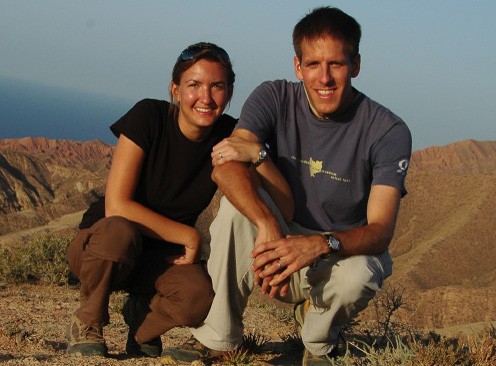
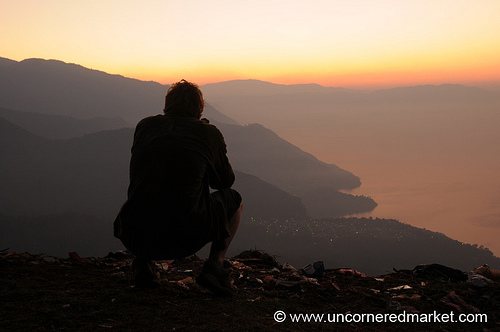
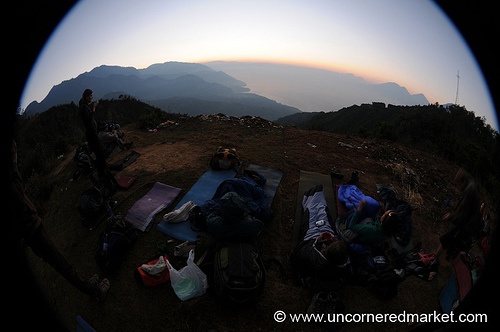
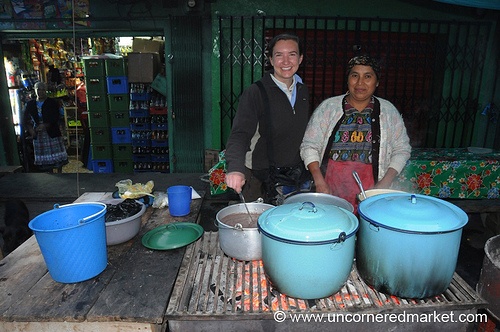
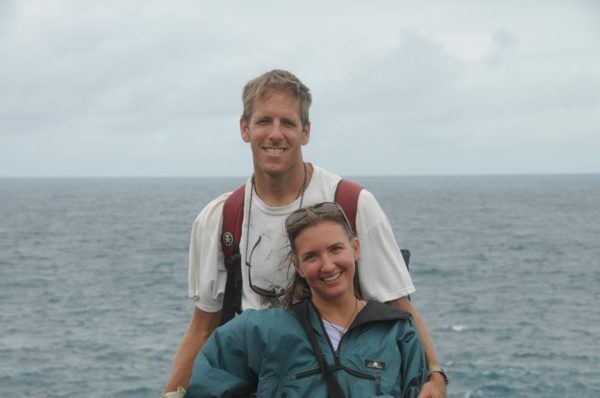

Ah, the joys of travel. Chicken buses. Hotels without hot showers. Local markets. You describe it beautifully and make me want to hit the road again!
@Friedel – I too think they did a terrific job of drawing us into their full-time travel lifestyle! Thanks guys – and indeed – your stories are inspiring. I encourage readers to check the Uncornered Market blog…..it’s a favourite of mine.
They are one of my favorite travel blogs!
Ditto! I appreciate how Audrey and Dan take situations that normally would be portrayed as horrible or dramatic, and they find a silver lining. They constructively address travel dramas and maintain an ethical and moral perspective that is admirable.